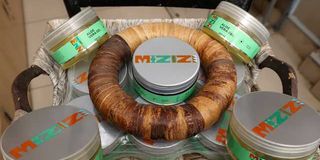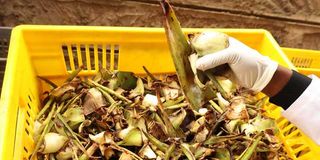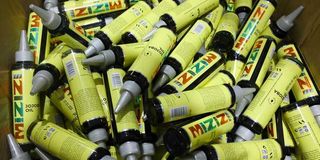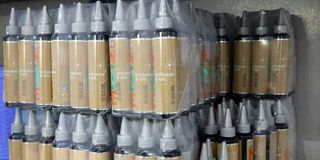
Sheth Naturals operations manager Stanley Mutuku (left) with an employee manning the aloe vera gel extraction machine at the firm’s facility on Lunga Lunga Road in Nairobi on April 5, 2025.
Aloe vera grows in abundance in Kenya, and one industry insider identified a significant untapped opportunity.
While the plant's renowned medicinal and cosmetic benefits were well known, the market was missing a crucial component: the need for high quality, structured aloe vera extracts that could meet the growing demands of the pharmaceutical, food and beauty sectors.
Sheth Organics has sought to meet the growing demand for high quality aloe vera extract by producing pure aloe vera extract from Aloe Barbadensis Miller, the highest quality and most nutritious variety of Aloe.
They have partnered with farmers in Makueni to enable large-scale cultivation of this plant.
“Sheth Organics is a subsidiary of Sheth Group of Companies, which also owns Sheth Naturals, a renowned cosmetics brand in Kenya recognised for pioneering natural haircare and skincare solutions, particularly through its well-established brands, Mizizi and Sheba,” says Stanley Mutuku, the company’s operations manager.

Sheth Naturals operations manager Stanley Mutuku at the facility on Lunga Lunga Road in Nairobi on April 5, 2025.
The company was founded in 2015 by Dr Gasheri Mugao, a former dentist, to address a gap in the market for natural hair and skincare products tailored to African consumers.
At the time, most products were either synthetic or contained harmful chemicals, often formulated by European companies for Caucasian hair types, which differ significantly from African hair.
“This difference led to various hair concerns, including hairline breakage, premature balding, greying, stunted growth, and weak hair follicles, all of which contributed to further breakage and thinning hair strands,” says Mutuku.
In response, Dr Mugao developed the Sheba haircare range, including shampoo bars, conditioners, curl cremes and wash & go gel, specifically designed for African hair.
In skin care, the Mizizi range was introduced, featuring oils, butters and hydrosols known for their natural benefits in treating concerns such as acne, stretch marks, dark spots and hyperpigmentation. The products are available in leading supermarkets, pharmacies and beauty stores nationwide.

Mizizi Aloe Vera Gel by Sheth Naturals.
Dr Mugao's background in healthcare inspired her to create safe and effective skincare solutions using botanical ingredients. This philosophy became central to Sheth, ensuring that all products were made with high quality, cold-pressed natural extracts.
Recognising the potential of aloe vera and leveraging over a decade of experience with pure, natural, plant-based products, they expanded into aloe vera extraction. They focus on Aloe Barbadensis Miller from Makueni for juice and gel extraction and Aloe Secundiflora from Samburu for Aloe Bitter Gum extraction.
The company's innovations have improved its product formulations while providing raw materials to other industries.
“We have established long-term partnerships with local farmers to ensure a stable and sustainable supply. We provide them with fair pricing, technical training, and support in acquiring the necessary documentation from the Kenya Wildlife Service (KWS) to ensure compliance with conservation laws,” Mr Mutuku says.
By emphasising sustainable harvesting practices, they encourage farmers to replant, preventing over-extraction and ensuring the long-term availability of the plant.

Aloe vera waste from the production of aloe vera extract at Sheth Naturals facility on Lunga Lunga Road in Nairobi on April 5, 2025.
Originally funded by the founder's savings, what began as a passion project quickly developed into a thriving business. Using a self-sustaining approach, the company has reinvested profits into scaling production and expanding market reach, allowing the business to grow organically.
“We believe in creating a sustainable ecosystem where both the business and the farmers benefit. Offering fair pricing and long-term con-tracts, we provide financial stability and a guaranteed market for their produce,” Mr Mutuku says.
This approach has created employment and income opportunities for rural women and youth, while empowering farmers with knowledge of sustainable practices to improve yields and ensure farm longevity. This contributes to long-term economic growth in communities.
The process begins with sourcing and harvesting the plant by hand, ensuring only the freshest and highest quality leaves are selected. Once harvested, they are immediately transported in refrigerated trucks to preserve their nutrients and freshness.
“Upon arrival at the Nairobi factory, each leaf is carefully sorted and cleaned with running water, then filleted, where a specialised machine separates the inner fillet from the rind, which is then manually refined. The sap is extracted from the fillet using a pulping machine,” he says.
The aloe vera extract is subjected to high pressure filtration to remove any impurities, ensuring a pure and high quality product. Depending on the intended use, the extract is either stored fresh, processed into gel or thickened for cosmetic applications.

Sheth Naturals products ready to be packaged.
The company currently processes up to 1,000 kilogrammes of gel per production batch, sold at Sh650 per kilogramme, and 500 kilogrammes of juice within 24 hours, priced at Sh1,900 per kilogramme. These figures are expected to increase as demand grows.
To maintain the stability and sustainability of the supply chain, vertical integration enables control over extraction and supply, reducing reliance on external suppliers.
“Our strategies include direct farm sourcing, cold chain logistics, ensuring extraction within 24 hours of harvesting, supporting replanting and biodiversity conservation, and turning idle land into productive aloe vera farms,” he says.
For quality assurance, each batch of extract and finished product undergoes rigorous testing, including pH, stability and microbial analysis, to ensure the formulations are free of harmful contaminants.
Samples are also sent to third party laboratories for independent verification. Once approved, the final products are packaged and shipped to suppliers and contracted businesses.
Mr Mutuku says that the production process adheres to local and international standards for cosmetic manufacturing, ensuring product safety for consumers.
Strict hygiene protocols and appropriate packaging materials also help to extend the shelf life of the products, eliminating the need for synthetic preservatives.

Sheth Naturals products.
Sheth Group initially operated with a small production team of three and a lean sales team of four representatives serving customers across the country. As demand grew, the company expanded to include merchandisers, brand ambassadors and customer service personnel.
They currently employ 30 permanent staff and 40 on short-term or part-time contracts.
“Our retail operations have also experienced significant growth. We began with a single outlet in Nairobi's CBD at Sasa Mall and have since expanded to include a factory shop in Lunga Lunga and a distribution centre in Tharaka Nithi, creating additional employment opportunities,” Mr Mutuku notes.
The team now includes industrial chemists, beauty advisors and stylists, social media managers and marketing professionals.
While he acknowledges the challenges of starting a manufacturing business in Kenya, the biggest hurdle has been consumer perception, with a widespread belief that locally made products are inferior to international brands.
“Overcoming consumer bias toward imported products has required consistent quality control and brand education,” he says, adding that another challenge was the complexity of sourcing raw materials.
Natural products rely on ingredients often subject to seasonality, logistical challenges and supply chain disruptions.
“We have faced challenges in scaling up production to meet growing demand, including high capital requirements for machinery expansion and rising production costs due to taxes and inflation. However, we have plans for a new factory in Kilifi,” he notes.

Sheth Naturals products.
The firm plans to introduce new formulations for product development and market expansion, such as cleansing soaps and leave-in conditioners.
Sheth Organics is also developing an aloe vera biofertiliser to address soil depletion in Kenya. Initially, the aloe vera extraction process produced 70 percent waste, which resulted in additional disposal costs. However, after extensive research, the firm discovered that this waste contains important nutrients that can be used to improve soil fertility.
The firm is also in the process of setting up two additional plants to extract natural raw materials, including shea butter and castor oil.
“We offer competitively priced premium products and have maintained price stability despite economic challenges, with the last adjustment made in 2023,” Mr Mutuku says. “This gives us an edge over imports, even though production costs in Kenya are much higher, a sacrifice we make to protect our clients’ trust.”
The company also ensures uniform pricing nationwide, so that customers pay the same recommended retail price (RRP) at every outlet.
“Our vision is to position the company as a leading brand in the African cosmetics industry and beyond. We aim to expand our exports – which currently reach Tanzania, Zambia, Mozambique and Australia – and explore new international markets,” he concludes.










